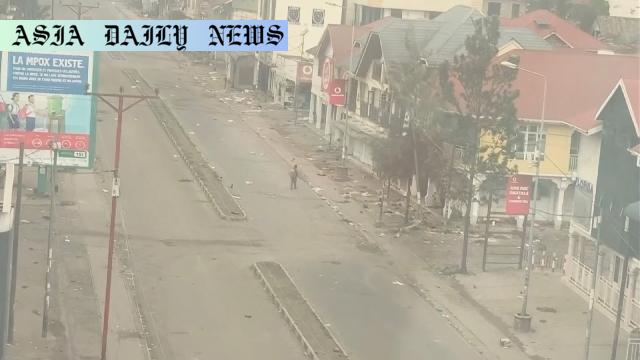DR Congo: African nations discuss emergency at joint summit.
- Key Point 1: African nations will meet in Tanzania to address DR Congo’s security crisis.
- Key Point 2: Rebel group M23 declared a ceasefire but fighting persists in Goma.
- Key Point 3: UN reports 2,900 deaths in Goma and warns of an epidemic risk.
- Key Point 4: DR Congo accuses Rwanda of supporting M23 rebels, refuted by Kigali.

African Nations to Address DR Congo’s Growing Crisis
The Democratic Republic of Congo (DRC) is experiencing one of the most alarming security crises in recent history. In response to the escalating violence and humanitarian challenges, leaders from the East African Community (EAC) and the Southern African Development Community (SADC) are preparing for an emergency summit scheduled to take place in Tanzania. The two-day meeting, set for Friday and Saturday, aims to bring regional stakeholders together and find a resolution to the conflict plaguing the DRC. The participation of key nations highlights the gravity of the situation and the need for collaborative efforts to restore peace.
Turmoil in Goma: A City in Crisis
Much of the focus is on Goma, a major hub city that has recently fallen under the control of M23 rebels. Despite the rebel group’s declaration of a unilateral ceasefire earlier this week, local UN officials have reported continuous fighting in the region. This development underscores the fragile nature of the ceasefire and raises doubts about the rebels’ intentions.
The United Nations has painted a grim picture of the devastation in Goma. Recent reports estimate that approximately 2,900 individuals have lost their lives in the city. Meanwhile, the recovery of bodies from various parts of Goma has posed additional public health challenges. The UN has warned of the potential spread of diseases due to decomposing corpses and overwhelmed morgues. These conditions have sparked fears of an impending epidemic, compounding the misery for local residents already grappling with violence and displacement.
DRC’s Allegations Against Rwanda
The DRC government has openly criticized Rwanda, accusing its neighboring country of supporting the M23 rebels. Kigali has consistently denied these allegations, but the accusations have strained relations between the two nations. As tensions rise, many fear that this geopolitical conflict could hinder diplomatic attempts to resolve the current crisis. The international community, including the United Nations, is urging both nations to focus on peace and avoid escalating the conflict further.
International Interventions: A Call for Peace
UN Secretary-General Antonio Guterres has joined the call for an end to hostilities in the DRC. In his statement on Thursday, he urged neighboring countries and the African Union to take an active role in resolving the crisis. Guterres emphasized the urgency of the matter, stating, “It is time to end this crisis.” With his attendance confirmed at next week’s summit-level meeting of the African Union in Ethiopia, Guterres is expected to advocate for stronger collective action and greater humanitarian assistance to alleviate the suffering in the DR Congo.
The Way Forward
The ongoing crisis in the DRC is a stark reminder of the challenges in achieving peace and stability in conflict-stricken regions. For a sustainable resolution, coordinated efforts from African nations, international bodies, and humanitarian organizations are needed. Addressing the root causes of the conflict, ensuring accountability for atrocities, and providing adequate support to affected populations must remain high priorities. The upcoming summits in Tanzania and Ethiopia carry significant weight, as they offer an opportunity for constructive dialogue and the renewal of global commitment to aiding the people of the DRC.



Commentary
The Humanitarian Crisis in DR Congo: A Ticking Bomb
The security situation in the Democratic Republic of Congo is nothing short of catastrophic, with lives lost and families torn apart amid rampant violence. The staggering toll of 2,900 deaths in Goma alone is not just a statistic; it represents human lives extinguished and communities plunged into despair. This tragedy highlights the profound vulnerabilities of conflict-affected regions and emphasizes the urgent need for international attention. The possibility of an epidemic due to overcrowded morgues and uncollected bodies only adds to the complexity of the crisis, underscoring the fragility of these environments.
Rebel Dynamics and the Role of Regional Powers
The role of M23 rebels in the ongoing conflict is undeniably significant and troubling. Their decision to declare a ceasefire, while seemingly a step in the right direction, has proven to be insincere given reports of continued fighting. It raises critical questions about the rebels’ true motives and the extent of their support network. The DRC’s accusation that Rwanda backs M23 further complicates matters, pointing to a larger geopolitical struggle beyond the immediate conflict in Goma. Resolving this issue will require direct engagements between the DRC and Rwanda, with mediators ensuring transparency and fairness.
A Path Towards Hope
While the current situation seems dire, the coordinated diplomatic interventions by African leaders and the United Nations offer a glimmer of hope. The urgency expressed by Secretary-General Antonio Guterres serves as a rallying cry for the international community to step up its efforts. Yet, sustainable peace requires more than just ceasefires and summits. It demands addressing the underlying socio-economic and political grievances that fuel conflicts. Collaboration between regional powers, global organizations, and civil society groups will be essential to rebuilding trust and restoring stability in the DRC.